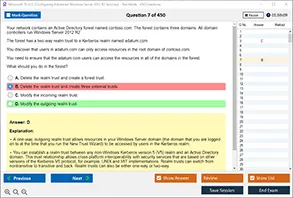Introduction
The Internet Protocol (IP) is the backbone of modern networking, enabling devices to communicate across local and global networks. It is a fundamental component of the TCP/IP suite, which powers the internet and most private networks. Understanding the features of the IP protocol is not only essential for networking professionals but also a critical topic in the Cisco Certified Network Associate (CCNA) 200-301 exam. In this article, we will explore the features of the IP protocol, its role in the 200-301 exam, and how resources like DumpsArena can help aspiring candidates succeed.
What is the IP Protocol?
The Internet Protocol (IP) is a network layer protocol responsible for addressing, routing, and delivering data packets between devices on a network. It operates on the principle of packet-switching, where data is broken into smaller packets, transmitted independently, and reassembled at the destination. IP is connectionless, meaning it does not establish a dedicated connection before sending data, and it is unreliable, as it does not guarantee delivery, leaving error-checking and retransmission to higher-layer protocols like TCP.
Key Features of the IP Protocol
To answer the question, "Which statement describes a feature of the IP protocol?" let’s break down its core features:
1. Connectionless Communication
- IP does not require a handshake or connection setup before transmitting data. Each packet is treated independently, allowing for efficient and flexible communication.
2. Best-Effort Delivery
- IP does not guarantee that packets will reach their destination. It makes a "best effort" to deliver packets but relies on other protocols (like TCP) to handle errors and retransmissions.
3. Packet-Switching
- Data is divided into smaller packets, each containing a header with source and destination IP addresses. These packets can take different paths to reach the destination, improving network efficiency.
4. Addressing
- IP uses logical addressing (IPv4 or IPv6) to uniquely identify devices on a network. IPv4 addresses are 32-bit (e.g., 192.168.1.1), while IPv6 addresses are 128-bit (e.g., 2001:0db8:85a3::8a2e:0370:7334).
5. Routing
- IP enables routers to forward packets between networks based on the destination IP address. Routing protocols like OSPF, EIGRP, and BGP work in conjunction with IP to determine the best path for data.
6. Fragmentation and Reassembly
- IP can fragment large packets into smaller ones to accommodate the Maximum Transmission Unit (MTU) of a network. The receiving device reassembles the fragments into the original packet.
7. Version Support
- IP supports both IPv4 and IPv6. IPv6 was introduced to address the limitations of IPv4, such as address exhaustion, and includes additional features like improved security and auto-configuration.
8. Time-to-Live (TTL)
- Each IP packet contains a TTL field that limits its lifespan. The TTL value decreases with each hop, preventing packets from circulating indefinitely in the network.
9. Interoperability
- IP is designed to work with a wide range of hardware and software, making it the universal protocol for internet communication.
Role of IP Protocol in the Cisco 200-301 Exam
The Cisco 200-301 exam, also known as the CCNA exam, is a comprehensive certification test that validates a candidate's knowledge and skills in networking fundamentals, IP connectivity, network access, security, and automation. The IP protocol is a central topic in this exam, and understanding its features is crucial for success.
Key Areas Where IP Protocol is Tested:
- IP Addressing and Subnetting
- Candidates must demonstrate proficiency in IPv4 and IPv6 addressing, subnetting, and calculating subnet masks.
- Routing Concepts
- Understanding how IP packets are routed across networks, including static and dynamic routing protocols.
- Network Layer Functions
- Knowledge of IP's role in the OSI model, including fragmentation, addressing, and packet forwarding.
- Troubleshooting IP Networks
- Diagnosing and resolving issues related to IP connectivity, such as incorrect IP addresses, subnetting errors, or routing problems.
- IPv6 Implementation
- Configuring and troubleshooting IPv6 networks, including addressing schemes and transition mechanisms.
Sample Exam Question:
Which statement describes a feature of the IP protocol?
- A) It guarantees delivery of packets.
- B) It establishes a connection before transmitting data.
- C) It uses logical addressing to route packets.
- D) It operates at the transport layer.
Correct Answer: C) It uses logical addressing to route packets.
This question tests the candidate's understanding of IP's core features, emphasizing its use of logical addressing for routing.
How DumpsArena Supports Cisco 200-301 Exam Preparation?
Preparing for the Cisco 200-301 exam requires a deep understanding of networking concepts, including the IP protocol. DumpsArena is a trusted resource that provides high-quality exam dumps, practice questions, and study materials to help candidates succeed.
Benefits of Using DumpsArena:
- Comprehensive Question Bank
- DumpsArena offers a vast collection of practice questions, including those specifically focused on the IP protocol and its features. These questions are designed to mimic the format and difficulty level of the actual exam.
- Detailed Explanations
- Each question comes with a detailed explanation, helping candidates understand the underlying concepts and reasoning behind the correct answers.
- Real Exam Simulation
- DumpsArena's practice tests simulate the real exam environment, allowing candidates to assess their readiness and identify areas for improvement.
- Updated Content
- The platform regularly updates its question bank to reflect the latest exam objectives and trends, ensuring candidates have access to the most relevant materials.
- Time-Saving
- By focusing on key topics like the IP protocol, DumpsArena helps candidates optimize their study time and avoid unnecessary distractions.
- Confidence Building
- Practicing with DumpsArena's materials builds confidence, reduces exam anxiety, and increases the likelihood of passing the 200-301 exam on the first attempt.
Why DumpsArena is a Preferred Choice for Cisco Certification?
DumpsArena has earned a reputation as a reliable and effective resource for Cisco certification candidates. Here’s why it stands out:
- User-Friendly Interface
- The platform is easy to navigate, making it accessible for candidates of all skill levels.
- Affordable Pricing
- DumpsArena offers cost-effective study materials, making it an excellent choice for budget-conscious learners.
- Community Support
- Candidates can connect with a community of like-minded individuals, share tips, and seek advice on challenging topics.
- Proven Success Rate
- Many candidates have successfully passed the Cisco 200-301 exam using DumpsArena's resources, attesting to their effectiveness.
Conclusion
The IP protocol is a cornerstone of modern networking, and understanding its features is essential for anyone pursuing a career in IT or networking. For candidates preparing for the Cisco 200-301 exam, mastering the IP protocol is a critical step toward achieving certification. Resources like DumpsArena provide invaluable support by offering high-quality practice questions, detailed explanations, and real exam simulations. By leveraging these tools, candidates can enhance their knowledge, build confidence, and increase their chances of passing the exam.
Whether you're exploring the features of the IP protocol or preparing for the Cisco 200-301 exam, DumpsArena is your go-to resource for success. Start your journey today and take the first step toward becoming a certified networking professional!
Get Accurate & Authentic 500+ Cisco 200-301 Exam Questions
1. Which of the following is a primary feature of the IP protocol?
a) Ensures reliable delivery of packets
b) Provides error-checking and correction
c) Handles addressing and routing of packets
d) Establishes end-to-end connections
2. What is the primary purpose of the IP protocol in networking?
a) To manage data encryption
b) To provide logical addressing and routing
c) To ensure data integrity
d) To establish secure connections
3. Which statement is true about the IP protocol?
a) It guarantees packet delivery
b) It operates at the transport layer
c) It is connectionless and unreliable
d) It provides flow control mechanisms
4. What type of addressing does the IP protocol use?
a) Physical addressing (MAC addresses)
b) Logical addressing (IP addresses)
c) Port addressing
d) Session addressing
5. Which layer of the OSI model does the IP protocol operate on?
a) Data Link Layer
b) Network Layer
c) Transport Layer
d) Application Layer
6. What does the IP protocol use to route packets between networks?
a) MAC addresses
b) Port numbers
c) IP addresses and routing tables
d) Session IDs
7. Which of the following is NOT a feature of the IP protocol?
a) Packet fragmentation
b) Logical addressing
c) Error correction
d) Best-effort delivery
8. What does "best-effort delivery" mean in the context of the IP protocol?
a) Guarantees packet delivery without errors
b) Delivers packets as efficiently as possible but does not guarantee delivery
c) Ensures packets are delivered in the correct order
d) Provides encryption for secure delivery
9. Which of the following protocols works closely with IP to ensure reliable communication?
a) TCP
b) UDP
c) ICMP
d) ARP
10. What happens if a packet is too large for a network segment in IP?
a) The packet is dropped
b) The packet is fragmented into smaller pieces
c) The packet is rerouted to a different network
d) The packet is sent without fragmentation



